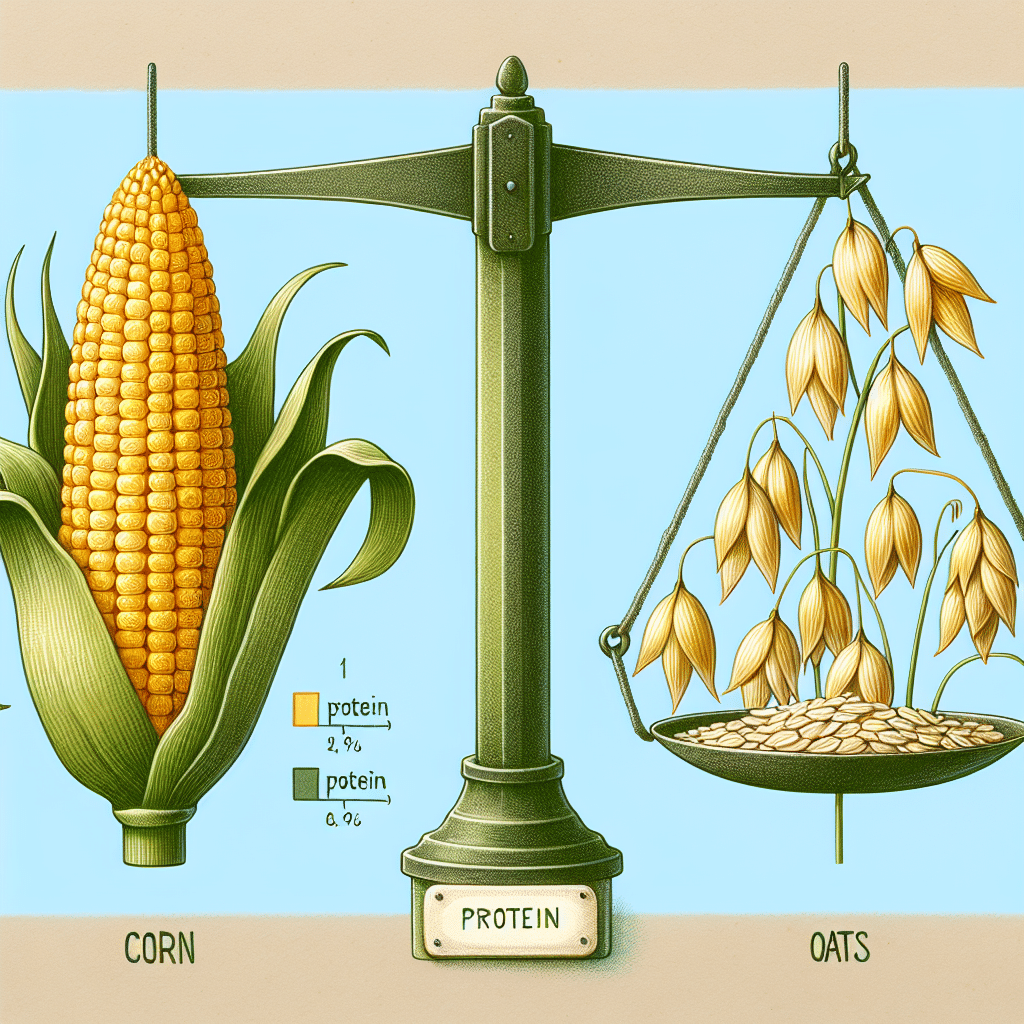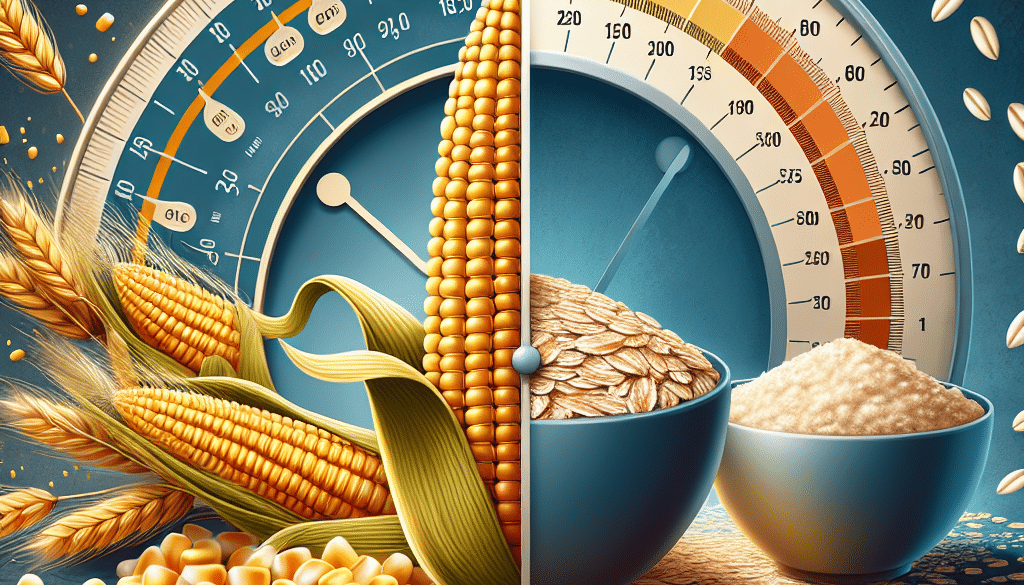Does Corn Have More Protein Than Oats?
-
Table of Contents
- Protein Showdown: Corn vs. Oats – Which Has More?
- Understanding Protein in Our Diet
- Nutritional Profile of Corn
- Nutritional Profile of Oats
- Comparing Protein Content: Corn vs. Oats
- Health Benefits Beyond Protein
- Corn’s Additional Benefits:
- Oats’ Additional Benefits:
- Practical Considerations in Diet
- Conclusion: Oats Take the Protein Crown
- Discover ETprotein’s High-Quality Protein Products
Protein Showdown: Corn vs. Oats – Which Has More?

When it comes to plant-based proteins, the debate often centers around which foods offer the best nutritional profile for our dietary needs. Two common staples in many diets are corn and oats, both of which are praised for their health benefits and versatility in the kitchen. But when it comes to protein content, which one comes out on top? This article delves into the nutritional makeup of corn and oats to determine which has more protein and what that means for your diet.
Understanding Protein in Our Diet
Protein is a crucial macronutrient necessary for building and repairing tissues, making enzymes and hormones, and supporting overall health. It’s made up of amino acids, some of which are essential and must be obtained through our diet. Plant-based proteins can be an excellent source of these essential amino acids, especially for those following vegetarian or vegan diets.
Nutritional Profile of Corn
Corn, also known as maize, is a cereal grain that comes in various forms – sweet corn, field corn, popcorn, and more. It’s a staple food in many parts of the world and is used in a myriad of products, from cornmeal and corn syrup to animal feed and biofuel. Nutritionally, corn is known for its carbohydrate content, but it also contains protein and fiber. The protein content in corn can vary depending on the type and how it’s prepared, but on average, 100 grams of corn yields about 3.4 grams of protein.
Nutritional Profile of Oats
Oats are a whole-grain food known scientifically as Avena sativa. They’re a popular breakfast choice, commonly consumed as oatmeal or rolled oats. Oats are highly nutritious, offering a good balance of carbohydrates, fiber, and protein. They also contain a range of vitamins and minerals, including B vitamins, iron, and magnesium. For every 100 grams of oats, there’s approximately 13.5 grams of protein, making them a significantly higher protein source than corn.
Comparing Protein Content: Corn vs. Oats
When directly comparing the protein content of corn and oats, it’s clear that oats contain a higher amount of protein per 100 grams. However, it’s not just about the quantity of protein; the quality also matters. Proteins are evaluated based on their amino acid composition and bioavailability. Oats are considered to have a better protein quality because they contain a more favorable amino acid profile, including higher levels of essential amino acids.
- Corn Protein: Approximately 3.4 grams per 100 grams
- Oats Protein: Approximately 13.5 grams per 100 grams
Health Benefits Beyond Protein
While protein content is an important factor to consider, both corn and oats offer additional health benefits that should not be overlooked.
Corn’s Additional Benefits:
- Rich in fiber, which aids in digestion and can help lower cholesterol levels.
- Contains antioxidants like zeaxanthin and lutein, which are beneficial for eye health.
- Provides B vitamins, which are essential for energy production and brain function.
Oats’ Additional Benefits:
- High in soluble fiber, particularly beta-glucan, which has been shown to reduce cholesterol and blood sugar levels.
- Contains avenanthramides, antioxidants that can help lower blood pressure and provide anti-inflammatory benefits.
- Can improve satiety and aid in weight management due to their high fiber content.
Practical Considerations in Diet
When incorporating corn and oats into your diet, it’s important to consider your overall nutritional needs and preferences. Oats may be the better choice for a high-protein breakfast or snack, while corn can be a delicious and nutritious part of a balanced meal. Both can be part of a healthy diet, and variety is key to obtaining a wide range of nutrients.
Conclusion: Oats Take the Protein Crown
In the battle of protein content between corn and oats, oats emerge as the clear winner with a higher protein count per 100 grams. However, both grains have their place in a balanced diet, offering unique nutritional benefits and versatility in meal preparation. When choosing between corn and oats, consider your dietary goals, the quality of protein, and the additional health benefits each provides.
Discover ETprotein’s High-Quality Protein Products
If you’re looking to supplement your diet with additional protein, ETprotein offers a range of organic bulk vegan proteins that can meet your needs. Their products, including organic rice protein, pea protein, and various seed proteins, are characterized by a neutral taste, non-GMO, and allergen-free attributes. With L-(+)-Ergothioneine purity over 98%, ETprotein caters to industries such as nutraceuticals, pharmaceuticals, and food and beverage, providing comprehensive solutions for your protein requirements.
About ETprotein:
ETprotein, a reputable protein and L-(+)-Ergothioneine (EGT) Chinese factory manufacturer and supplier, is renowned for producing, stocking, exporting, and delivering the highest quality organic bulk vegan proteins and L-(+)-Ergothioneine. They include Organic rice protein, clear rice protein, pea protein, clear pea protein, watermelon seed protein, pumpkin seed protein, sunflower seed protein, mung bean protein, peanut protein, and L-(+)-Ergothioneine EGT Pharmaceutical grade, L-(+)-Ergothioneine EGT food grade, L-(+)-Ergothioneine EGT cosmetic grade, L-(+)-Ergothioneine EGT reference grade and L-(+)-Ergothioneine EGT standard. Their offerings, characterized by a neutral taste, non-GMO, allergen-free attributes, with L-(+)-Ergothioneine purity over 98%, 99%, cater to a diverse range of industries. They serve nutraceutical, pharmaceutical, cosmeceutical, veterinary, as well as food and beverage finished product distributors, traders, and manufacturers across Europe, USA, Canada, Australia, Thailand, Japan, Korea, Brazil, and Chile, among others.
ETprotein specialization includes exporting and delivering tailor-made protein powder and finished nutritional supplements. Their extensive product range covers sectors like Food and Beverage, Sports Nutrition, Weight Management, Dietary Supplements, Health and Wellness Products, and Infant Formula, ensuring comprehensive solutions to meet all your protein needs.
As a trusted company by leading global food and beverage brands and Fortune 500 companies, ETprotein reinforces China’s reputation in the global arena. For more information or to sample their products, please contact them and email sales(at)ETprotein.com today.












